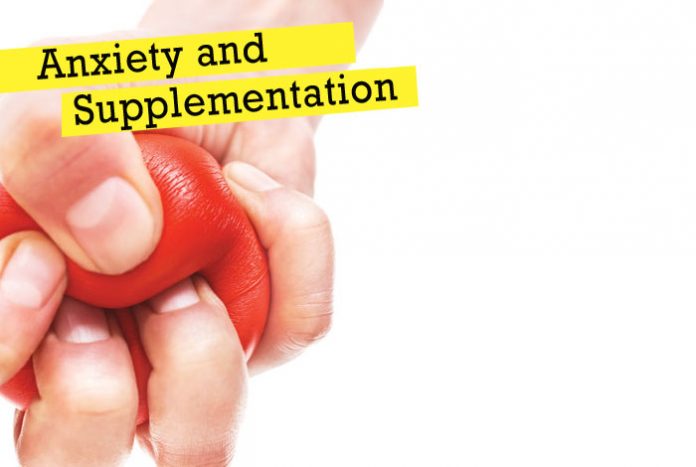It’s important to keep in mind that anxiety is a very complicated disorder, as the cause can be anything from a vitamin/nutrient imbalance, to an underlying medical disorder. If you are on prescription medication, talk to your doctor before starting any of the below supplements. They’re not usually harmful by themselves, but it may happen that the ingredients could negatively react with the pharmaceutical chemicals. As everybody is different, it may take some experimentation with these supplements and their dosages to find the right one(s) that suit you. It may also be worthwhile to see a homeopathic physician who will work in collaboration with your primary doctor to find a good regimen.
Herbs and Supplements will not cure anxiety and should only be used as additional aids while you tackle the actual cause.
MagnesiumIt is believed that prolonged stress and anxiety causes you to lose much more magnesium through the urine than what is normal. Have you ever had a muscle twitch that came out of nowhere, and left you in fear and confusion as to what it might be? Or have experienced out of the blue heart palpitations at night before sleep? That may all be a combination of stress, lack of enough rest, and you guessed it... a deficiency in magnesium. | |
Vitamin DVitamin D deficiency is a common occurrence in most people. It’s especially prevalent in the winter months because it’s most often caused by lack of or very little exposure to sunlight. This vitamin, however, plays a vital role in well-being. People with seasonal affective disorder (SAD), or depression during the winter months, have been found to have very low vitamin D levels during this time. | |
Fish OilIf you're not eating fish like mackerel, herring, sardines, tuna, salmon at least twice a week then to increase your intake of omega-3 fatty acids you should consider supplements. As not everyone likes the taste or smell of oily fish, thank goodness for fish oil supplements. Neuroscientist, Dr. Andrew Stoll, from Harvard Medical School has found that natural sources of the essential fatty-acid, omega-3, which is found in oily fish like salmon and mackerel, may help bring mood back into balance. | |
Vitamin B-ComplexB-complex vitamins are very affordable and rarely react negatively to prescription medications. Those with anxiety have been found to have low levels of all B vitamins. Older people have difficulty retaining B12. A B-vitamin complex supplement is therefore highly recommended during periods of convalescence. | |
Chamomile TeaA study of 19 people diagnosed with anxiety at the University of Pennsylvania were involved in a double-blind and placebo-controlled investigation. This involved 220 milligrams of chamomile extract and a placebo. The treatment period spanned over an 8 weeks. Researchers found that 57% of the group that used Chamomile extract had reduced their anxiety levels by 50% or more. | |
St John's WortSt. John’s Wort has been used since the Victorian days to relieve stress and anxiety. A research team from the Munich Technical University reviewed 29 studies of the use of St. John’s Wort. Overall, the studies did show that the herb was more effective than the placebos and just as effective as some prescription medications. | |
L-TheanineL-Theanine is an amino acid which is commonly found in green tea. It promotes a calm relaxed mood by elevateing levels of GABA, as well as serotonin and dopamine. One of the appealing aspects of L-theanine is that it works to relax without sedating. That can make L-theanine a good choice for people who are looking to enhance their “wakeful relaxation,” without worrying about becoming sleepy and fatigued during the day. | |
AshwagandhaAshwagandha is a medicinal herb native to India. It is commonly used in Ayurvedic medicine. Sometimes known as ‘Indian ginseng’ the roots of ashwagandha are used in herbal medicine to increase vitality in the body, prevent anxiety and improve quality of sleep. | |
ValerianThe root has been used for thousands of years to reduce stress and anxiety, as well as to help with insomnia. Overuse can cause sedating side effects, so use it according to the recommendations or under the guidance of a medical practitioner. | |
Passion-FlowerPassion-flower is used beneficially in those with generalized anxiety as a complement to their current treatment. It increases GABA levels in the brain, inducing a state of non-sedating relaxation. The University of Maryland Medical Center notes that passion-flower is much milder than Valerian, so if that proves to be too much for you, then try this one instead. | |
5-HTP5-Hydroxytryptophan (5-HTP) is an amino acid that is naturally produced in the body. Your body uses it to produce serotonin, a chemical messenger that sends signals between your nerve cells. Low serotonin levels are associated with depression, anxiety, sleep disorders, weight gain and other health problems. |













